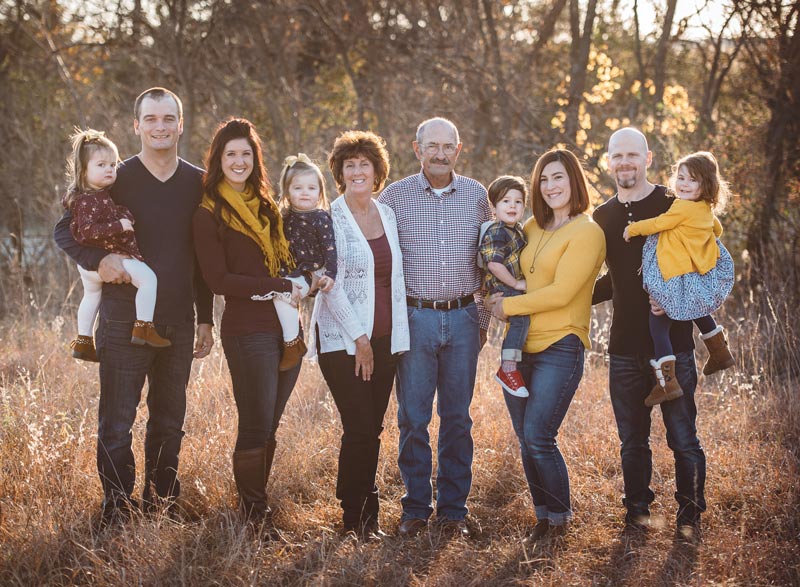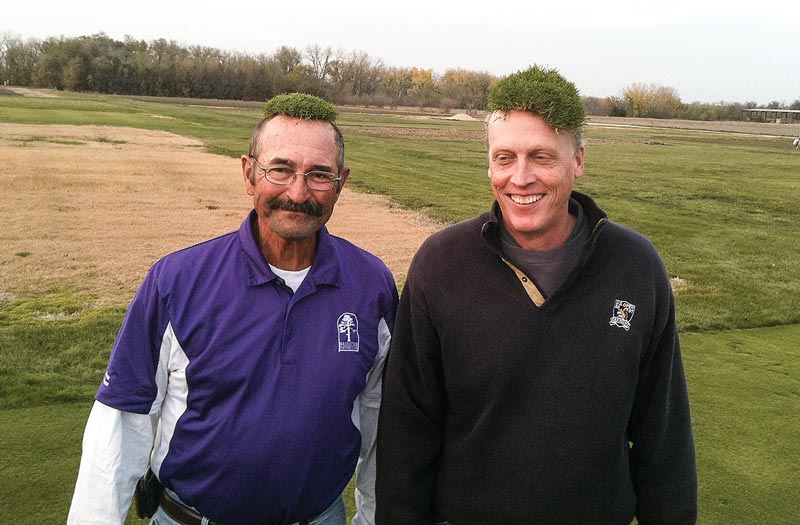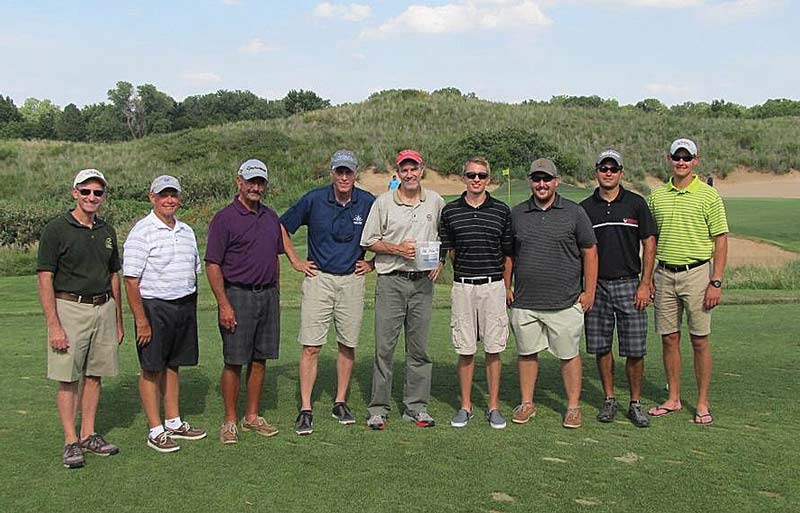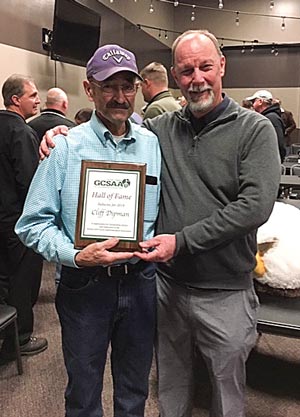
Last Thanksgiving was an opportunity for Cliff Dipman to spend precious time with his family. They are, from left: Nic Youngers, holding daughter Laila; Cortney Youngers, holding daughter Leah; Christy and Cliff Dipman; Kelsey Gabel, holding son Jameson; and Mike Gabel, holding daughter Charlie. Cliff Dipman, who is fighting cancer, has received a groundswell of support from those who worked for him in the turf industry throughout the years. Photo courtesy of Christy Dipman
He drank coffee all day, reveled in mud, served as a father figure and helped anyone in need.
Undoubtedly, Cliff Dipman was exactly what Manhattan, Kan., needed. As golf course superintendent, Dipman oversaw a revival of Manhattan Country Club from 1981 to 2013. He was on the clock upon being hired — and there was no time to waste. “People had gotten fed up with the condition of the golf course. We had a lot of grumpy members,” says Paul Van Nostran, a member since 1965.
In time, Dipman would guide a comeback of epic proportions. His efforts supplemented with a legion of devoted crew members took it to another level. “I don’t know where the club would be now if it wasn’t for Cliff’s timely arrival,” Van Nostran says.
Once again, time is of the essence for Dipman, because he is uncertain how much of it he has left. Dipman, 72, is battling stage 4 head and neck cancer. Fifteen years ago, he was diagnosed with cancer and lived with a feeding tube for a year. He beat it, but scans last October showed it had returned. Dipman finished his last round of radiation Feb. 21 before embarking on nine weeks of chemotherapy. “This is our last shot. It (cancer) is spreading,” says his wife, Christy.
Dipman lost his voice following radiation, but so many of those who worked for or are acquainted with Dipman are more than willing to shout their praise of him.
“If anyone has a problem with Cliff, you need to evaluate yourself as a human being,” says Jaron Gerber of Gerber Grass Unlimited in Wichita, Kan., who, as a Kansas State University student, worked for Dipman.
The Dipman tree of those who went on to serve in the industry is majestic. Sprawling. Thick. “There are many branches to the Cliff tree. I’m a branch,” says Kevin Fateley, GCSAA Class A superintendent at Wildcat Fitness & Fun in Manhattan and a 29-year GCSAA member. “I have people who have branched off of me, using Cliff’s concepts.”
Cody Osborne is a thankful branch. “His reach goes farther than any superintendent I’ve ever known,” says Osborne, a distributor for BWI based in Edmond, Okla. “My senior year, I didn’t have a job lined up, told him, ‘My GPA isn’t the best, but I want to be in the industry.’ He said, ‘I can get you wherever you want to go.’ His word was better than anything I’ve ever known (Osborne landed a job shortly after school). He laid the foundation for my career, and I will be forever grateful.”
Like so many others who branched out under Dipman, Jason Reiswig oozes sadness seeing Dipman’s current plight. “I hate it,” says Reiswig, Class A superintendent at El Dorado, Kan., Parks and Recreation and 23-year association member.
The making of legends
There might not be anybody tougher than Dipman. He proved that when he was 3.
That’s how old Dipman was when he found a knife outside on a windy day in his hometown of Pratt, Kan. He was bringing it inside to show his mother when a gust blew the screen door shut. The knife slipped away from him and went into his left eye, which he ultimately lost. It was replaced by a glass eye.
Dipman, mentored by superintendent Gary Panter at Park Hills Country Club in Pratt, earned his first superintendent job in 1972 at Lake Barton Golf Club in Great Bend, Kan. He stayed there until Manhattan CC called.
Two amazing events happened in the 1980s in Manhattan. Often, the turnaround of K-State football is touted as “The Miracle in Manhattan.” In a sense, two miracles happened there. Van Nostran was a key figure in both. He was chairman at Manhattan CC when Dipman was being considered. Later that decade, Van Nostran was on the 1988 selection committee that helped choose Bill Snyder to coach the floundering K-State football team.
Snyder rebuilt the program into a conference champion that threatened for national titles. It was quite a feat, considering there was speculation before Snyder came that the downtrodden program would be dropped from the then-Big Eight Conference. Things weren’t much better at Manhattan CC before Dipman was hired. “I can’t say there would have been the demise of the club, but there was a lot of grumbling,” Van Nostran says.

Mixing work and fun has never been an issue for Dipman. Here he is having a lighthearted “turfhead” moment with Jack Fry, Ph.D., professor of turfgrass science at Kansas State University’s Olathe (Kan.) Horticulture Research and Extension Center. Photo courtesy of Jack Fry
Dipman fixed that. “He convinced me that he wasn’t the type of guy who would sit in his office all day and give directions, and he didn’t,” Van Nostran says. “He was a working superintendent. If a leak needed to be fixed, he was down on his hands and knees in the mud leading the way.”
Ryan Blew of Kansas Golf and Turf worked for Dipman in college and later as his assistant. That was enough time for him to make judgment. “Best boss I ever had,” Blew says. “He’s not a micromanager. He said, ‘Get out there. If you mess up, we’ll fix it.’ You can’t go anywhere at the club without seeing his handprints all over it, from the putting green that was installed to a new water feature we put in behind 18.”
Sounds like the stuff of legends. Speaking of legends, Snyder — who retired after last season and has been inducted into the College Football Hall of Fame — crossed paths with Dipman. Their efforts certainly lifted a country club and a football program in a town that was facing crossroads on both fronts before their arrival. “I’ve known him (Dipman) to be a highly respected superintendent who did a fantastic job at MCC and won numerous awards,” Snyder says. “His care of the greens and fairways at the club was exceptional. He also is a pleasant and gracious person.”
As Snyder did, Dipman accepted a monumental task and prevailed. That included rebuilding every green in-house. “I loved Manhattan Country Club the first time I saw it, but it was a goat ranch when I was hired in 1981,” says Dipman, a 42-year retired GCSAA member who corresponded with GCM via email. “I was told you couldn’t grow grass on the rock hill. The greens were small — half the size they are now — and lacked proper maintenance. The fairways were akin to a pasture, and equipment was limited and old. I didn’t even have a golf cart to survey the course when I first got there, so I walked the course’s 175 acres.”
Even when he was first told he had cancer, Dipman was rarely absent. “I only missed work on treatment days,” he says. “Having the golf course to take care of and being with the people I worked with gave me the determination to persevere.”
Story time
Who doesn’t have a Cliff Dipman story?
“We’d been looking for a valve box,” says Cole Thompson, Ph.D., a K-State student who worked for Dipman and who is now assistant director for USGA Green Section Research, “and he drove up, knew exactly where it was at, kicked off some silt or dirt that was on top of it, found the shutoff valve, and said, ‘You can’t do it without me,’ and drove off laughing. He always thought I stayed too clean when I fixed irrigation leaks. He’s stayed in touch with all of us. He’s like a surrogate parent.”
GCSAA Class A superintendent Paul Jonas recalls having popped the clutch once when he was behind the wheel of a dump truck while trying to build a tee. “He’d told me not to pop the clutch, but I was an intern doing intern things. It was a disaster waiting to happen, and he just shook his head at me,” says Jonas, a 32-year GCSAA member who was a K-State student who worked for Dipman before his current post overseeing Flint Hills National Golf Club in Andover, Kan. “He has a wealth of knowledge, and we were very green, young bucks, trying to capture as much knowledge as we could from him. For him to be in Manhattan at that time was a blessing for all of us.”

Dipman, third from left (at a Kansas State University scholarship and research tournament), has served as a research assistant at the Rocky Ford Turfgrass Research Center in Manhattan, Kan. His networking abilities and knowledge have buoyed the center in recent years. Photo courtesy of Jared Hoyle
Trampis Nickel, Class A superintendent at Wamego (Kan.) Country Club and a 20-year GCSAA member, recalls how Dipman dragged hoses when he was 60-plus years old and worked weekend shifts. “He’s a great mentor, but he also had the best grass. Best conditions in the state,” Nickel says.
Dipman sure has a knack for being thoughtful and caring. Kurt Erb, Dipman’s assistant on two different occasions, mentioned a time he and Dipman were driving in Manhattan and saw a stranded motorist. “The lady’s car stopped, hood up, so we stopped. Both of us have some mechanical ability. We got her back on the road,” says Erb, a manager for SiteOne Landscape Supply.
The club used to provide lunch for the crew. Until times got tough, that is. Dipman intervened. “He took money out of his own pocket and bought us sandwiches and chips,” says six-year GCSAA member Nic Youngers, Dipman’s son-in-law and Class A superintendent at Rolling Meadows Golf Course in Milford, Kan. “There were times he declined a raise so we (crew) could get raises. Great grass grower, but even better taking care of us.”
Fateley served on Dipman’s first crew 38 years ago. In December of that year, Dipman showed up at Fateley’s home with his hands full. “He came by with a 5-pound ham that had a hat on it. He wanted to know if I wanted to be promoted to assistant superintendent,” says Fateley, who was a K-State student at the time (he accepted). “Cliff created a good work environment. It was about doing things right and having fun doing it.”
Obviously. “When a new crew member came aboard, he (Dipman) would be waiting at the office door while someone would be on the roof with a bucket of water to initiate that person,” Jonas says.
Still fighting
Dipman has departed Manhattan CC, but he isn’t done.
As a research assistant at the Rocky Ford Turfgrass Research Center in Manhattan, Dipman has helped the center to advance turf research by using his hefty industry connections to seek donations of equipment and products to support the center’s cause. “He has never been formally trained as a teacher, but he has always taken on that role and has taught many naive students who later became excellent golf course superintendents,” says Jack Fry, Ph.D., professor of turfgrass science at K-State’s Olathe (Kan.) Horticulture Research and Extension Center and a 22-year GCSAA member.
Dipman became the first inductee into the Kansas GCSA Hall of Fame in January. That seems just about right for the man who served as president of the chapter and the Kansas Turfgrass Foundation and is namesake of the Cliff Dipman Internship Award that consists of two $2,000 scholarships earmarked for K-State students working at a course where the superintendent is an association member.

Right: Dipman holds the plaque he received Jan. 21 following his induction into the Kansas Golf Course Superintendents Association Hall of Fame. He is with GCSAA Class A superintendent Kevin Fateley of Wildcat Fitness & Fun, who worked for Dipman 38 years ago. Photo courtesy of Christy Dipman
Matt Miller, who was Dipman’s assistant in the mid-’90s but never felt like an assistant, speaks frequently to Christy Dipman for updates on the man who believed in him and in countless others. “Cliff said, ‘The course is yours. The crew is yours. You tell me what you need.’ That’s more than I could ask for,” says Miller, Class A superintendent at Carey Park Golf Course in Hutchinson, Kan., and 24-year association member. “He’s a fighter. He doesn’t give up easily. He trudges through whatever is thrown at him.”
Always has. “He was growing ryegrass in Kansas when people told him he couldn’t,” Youngers says.
When Kevin Fowler, Class A superintendent at Cherry Oaks Golf Course in Cheney, Kan., and a 21-year GCSAA member, approaches Dipman, Fowler knows what’s coming. “Every time I see him, it’s a hug. Not a handshake — it’s a hug. A big hug,” Fowler says.
Dipman is embraced as tightly as ever nowadays. He understands what he’s up against. Christy insists that he isn’t daunted by the challenge. Ask her how her husband handles it, and she says, “Like he does everything ... with a grain of salt. He’s a silent warrior.”
Bring it on, Dipman replies. “I’m still fighting the fight,” he says. “You learn not to sweat the small things. Enjoy what you do. And find joy in every day.”
Howard Richman is GCM’s associate editor.